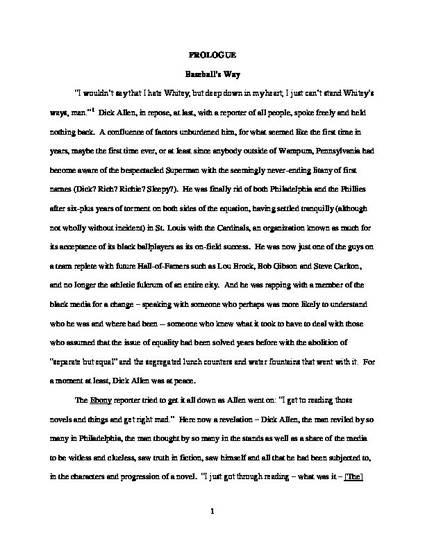
Book
God Almighty Hisself: The Life and Legacy of Dick Allen
(2016)
Abstract
“What I saw…persuaded me that (he) was the victim of an innate and incurable disorder. I might give alms to his body; but his body did not pain him; it was his soul that suffered, and his soul I could not reach.”
-- Herman Melville, “Bartleby The Scrivener.”
Through the course of his major league career, Dick Allen was without doubt recognized for doing a lot of things. He was the 1964 National League Rookie of the Year and the 1972 American League Most Valuable Player. His 351 home runs are more than Hall of Famer Ron Santo and trail Hall of Famer Orlando Cepeda by only 28 despite the fact that he accumulated nearly 1,400 fewer plate appearances than Cepeda. His three slugging titles dwarf the lone title claimed by the prototypical slugger of the era, Harmon Killebrew, and his lifetime .292 batting average tops Killebrew’s by 36 points. And for those who pray to the alter of sabermetrics, his “adjusted OPS+” is higher than the greatest slugger of all time, Hall of Famer Hank Aaron. Because of all that he did, the MLB Network in 2012 ranked him as a member of its “Top Ten Not in the Hall of Fame” (he placed ninth). However, despite all that he did, Dick Allen is remembered more often for the myriad ways he refused to participate: in pregame batting and fielding practice most obviously, but in other ways more subtly. He refused to pander to the media, refused to accept management’s time-honored methods for determining the value of a ballplayer, and most explosively, refused to go along with and kowtow to the racial double-standard that had evolved within Major League Baseball in the wake of the game’s integration in 1947. In all, because of all that he did and all he preferred not to do, Allen became one of the most controversial players in the history of a game replete with them. As Sports Illustrated summed him up in 1970, "He is known as a man who hits a baseball even harder than he hits the bottle. Allen shakes the game's Establishment and stirs up its followers as no other player can." Because of what he did and what he preferred not to do, nearly every baseball fan with an opinion has a strong one when it comes to Dick Allen.
“God Almighty Hisself: The Life and Legacy of Dick Allen,” (the title comes from a quote by George Myatt, interim manager of the Phillies, who upon his appointment responded to a question regarding whether he thought he could handle Allen with: “Stud, I believe God Almighty Hisself would have trouble handling Richie Allen”), is the first book aside from Allen’s autobiography (“Crash,” which is now a quarter century old and out of print) devoted exclusively to the curious and tragic career of the man some believe to be the best player not in the Hall of Fame and who others, including baseball guru Bill James, consider the game's most destructive and divisive force – ever. “God Almighty Hisself” is a comprehensive look at Allen’s strange, maddening and always fascinating career and explains how one of the greatest natural talents in the game's history both fulfilled and frustrated expectations all at once.
“God Almighty Hisself” also places Allen's story within the larger context of the legacy of Organized Baseball's process of desegregation, which began triumphantly with Jackie Robinson but which quickly led to a cruel double standard for all black players thereafter, who were compelled to comply with an unstated but brutally enforced character code that was not required of similarly or even less talented white players. As dozens of black players suffered the effects of this code in pained silence (and dozens more continued to be barred from the now "integrated" game for perceived personal shortcomings), black journalists and activists awaited the emergence of a black player with talent so prodigious and with a will so strong so as to expose and dispose of the vile double standard at last. Dick Allen was that player. Although anything but a civil rights activist and far from the "black militant" he was often portrayed to be, Allen was nevertheless the catalyst for the second, and often overlooked, step in baseball's integration process, which resulted in the acceptance of black players on their terms, not management's. Although he paid the price for his efforts in taunts, accusations and his ultimate ostracization from the game in many respects, Allen is the bridge between the first generation of black players, who were required to be seen but not heard, and the next, where free expression was, if not encouraged, at least tolerated of all players regardless of the color of their skin. Ultimately, in so many ways Dick Allen preferred not to. And despite its protestations, baseball was the better for it.
Keywords
- baseball,
- integration,
- dick allen,
- civil rights
Disciplines
Publication Date
Spring March 4, 2016
Publisher
University of Pennsylvania Press
Citation Information
Mitchell J Nathanson. God Almighty Hisself: The Life and Legacy of Dick Allen. Philadelphia(2016) Available at: http://works.bepress.com/mitchell_nathanson/34/
